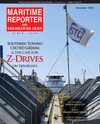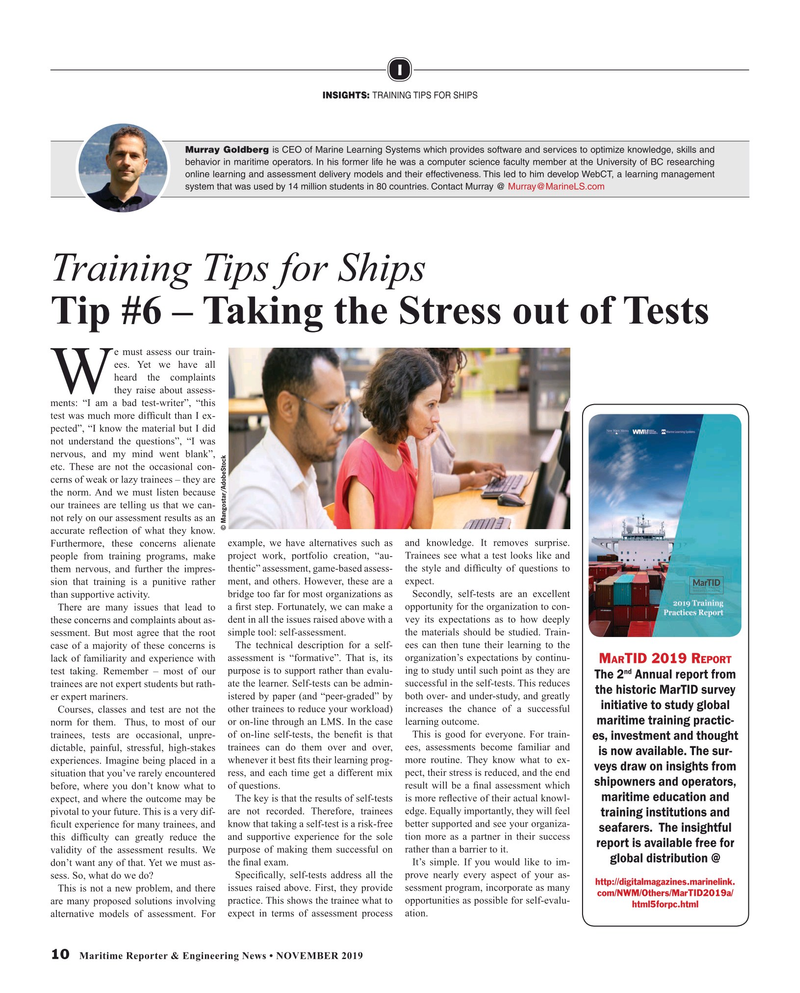
Page 10: of Maritime Reporter Magazine (November 2019)
Workboat Edition
Read this page in Pdf, Flash or Html5 edition of November 2019 Maritime Reporter Magazine
I
INSIGHTS: TRAINING TIPS FOR SHIPS
Murray Goldberg is CEO of Marine Learning Systems which provides software and services to optimize knowledge, skills and behavior in maritime operators. In his former life he was a computer science faculty member at the University of BC researching online learning and assessment delivery models and their effectiveness. This led to him develop WebCT, a learning management system that was used by 14 million students in 80 countries. Contact Murray @ [email protected]
Training Tips for Ships
Tip #6 – Taking the Stress out of Tests e must assess our train- ees. Yet we have all heard the complaints
W they raise about assess- ments: “I am a bad test-writer”, “this test was much more dif? cult than I ex- pected”, “I know the material but I did not understand the questions”, “I was nervous, and my mind went blank”, etc. These are not the occasional con- cerns of weak or lazy trainees – they are the norm. And we must listen because our trainees are telling us that we can- not rely on our assessment results as an © Mangostar/AdobeStock accurate re? ection of what they know.
Furthermore, these concerns alienate example, we have alternatives such as and knowledge. It removes surprise. people from training programs, make project work, portfolio creation, “au- Trainees see what a test looks like and them nervous, and further the impres- thentic” assessment, game-based assess- the style and dif? culty of questions to sion that training is a punitive rather ment, and others. However, these are a expect. than supportive activity. bridge too far for most organizations as Secondly, self-tests are an excellent
There are many issues that lead to a ? rst step. Fortunately, we can make a opportunity for the organization to con- these concerns and complaints about as- dent in all the issues raised above with a vey its expectations as to how deeply sessment. But most agree that the root simple tool: self-assessment. the materials should be studied. Train- case of a majority of these concerns is The technical description for a self- ees can then tune their learning to the lack of familiarity and experience with assessment is “formative”. That is, its organization’s expectations by continu-
M TID 2019 R AR EPORT nd test taking. Remember – most of our purpose is to support rather than evalu- ing to study until such point as they are
The 2 Annual report from trainees are not expert students but rath- ate the learner. Self-tests can be admin- successful in the self-tests. This reduces the historic MarTID survey er expert mariners. istered by paper (and “peer-graded” by both over- and under-study, and greatly initiative to study global
Courses, classes and test are not the other trainees to reduce your workload) increases the chance of a successful maritime training practic- norm for them. Thus, to most of our or on-line through an LMS. In the case learning outcome. trainees, tests are occasional, unpre- of on-line self-tests, the bene? t is that This is good for everyone. For train- es, investment and thought dictable, painful, stressful, high-stakes trainees can do them over and over, ees, assessments become familiar and is now available. The sur- experiences. Imagine being placed in a whenever it best ? ts their learning prog- more routine. They know what to ex- veys draw on insights from situation that you’ve rarely encountered ress, and each time get a different mix pect, their stress is reduced, and the end shipowners and operators, before, where you don’t know what to of questions. result will be a ? nal assessment which maritime education and expect, and where the outcome may be The key is that the results of self-tests is more re? ective of their actual knowl- pivotal to your future. This is a very dif- are not recorded. Therefore, trainees edge. Equally importantly, they will feel training institutions and ? cult experience for many trainees, and know that taking a self-test is a risk-free better supported and see your organiza- seafarers. The insightful this dif? culty can greatly reduce the and supportive experience for the sole tion more as a partner in their success report is available free for validity of the assessment results. We purpose of making them successful on rather than a barrier to it.
global distribution @ don’t want any of that. Yet we must as- the ? nal exam. It’s simple. If you would like to im- sess. So, what do we do? Speci? cally, self-tests address all the prove nearly every aspect of your as- http://digitalmagazines.marinelink.
This is not a new problem, and there issues raised above. First, they provide sessment program, incorporate as many com/NWM/Others/MarTID2019a/ are many proposed solutions involving practice. This shows the trainee what to opportunities as possible for self-evalu- html5forpc.html alternative models of assessment. For expect in terms of assessment process ation. 10 Maritime Reporter & Engineering News • NOVEMBER 2019
MR #11 (10-17).indd 10 11/4/2019 10:12:18 AM

 9
9

 11
11
